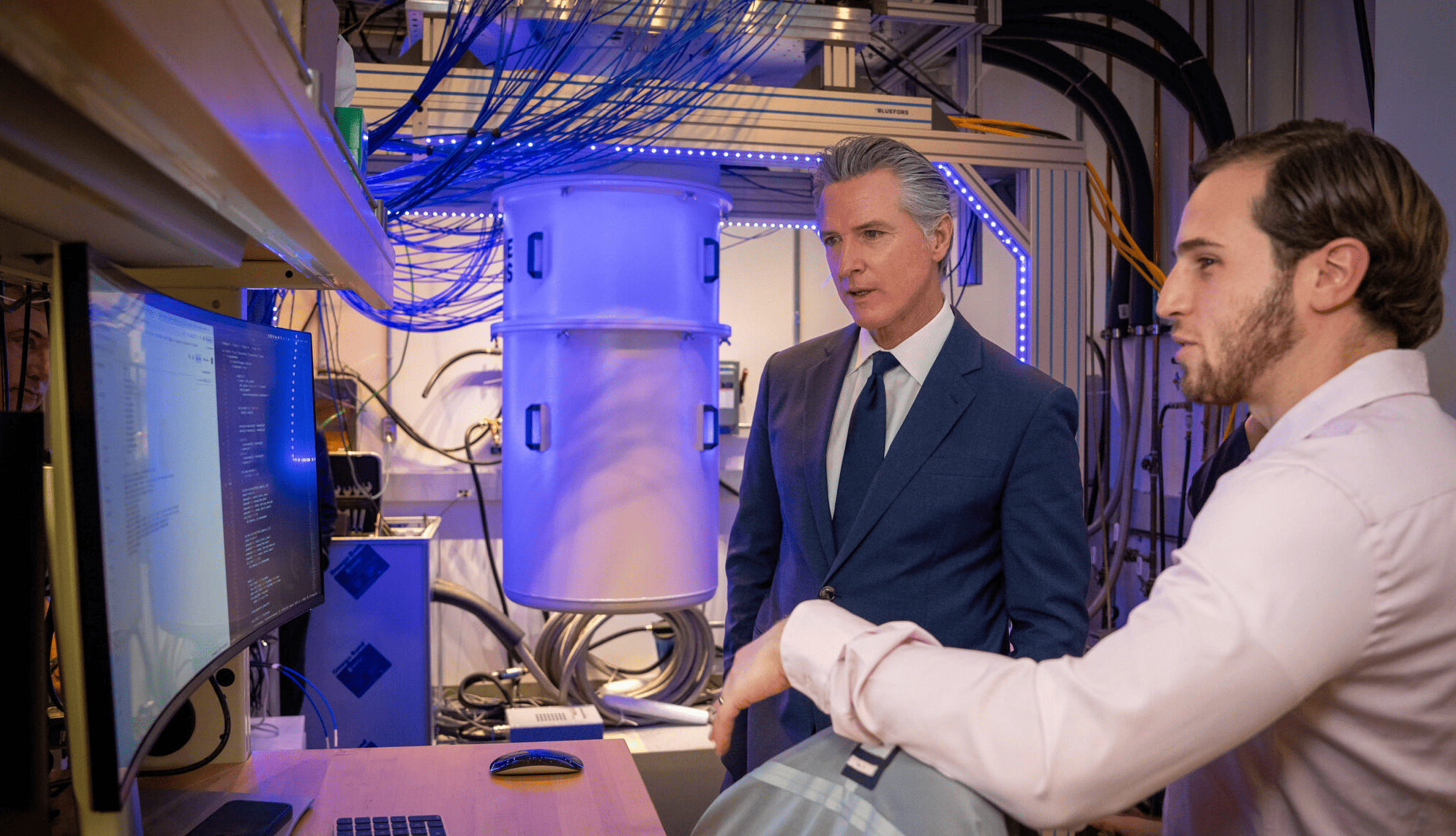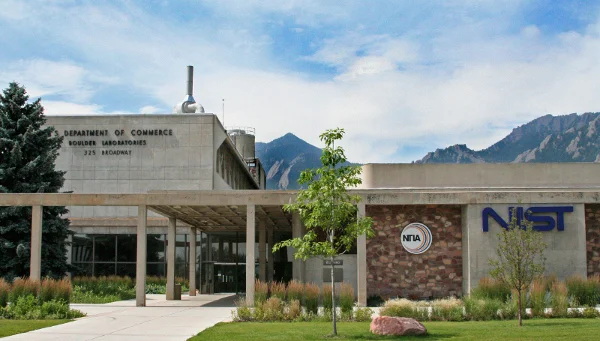Insider Brief
- Governor Gavin Newsom has signed Assembly Bill 940 into law, directing the Governor’s Office of Business and Economic Development (GO-Biz) to create California’s first statewide strategy for the quantum technology sector by July 1, 2026.
- The law makes quantum technology the state’s top strategic priority under the California Jobs First State Economic Blueprint, tasking GO-Biz with developing plans to attract investment, grow jobs, and coordinate public–private partnerships in key industries.
- The announcement coincided with $4 million in new state funding for quantum research and innovation, reinforcing California’s role as home to both Department of Energy and National Science Foundation quantum centers and major corporate research labs at UC campuses.
- Image: Newsom talking with quantum scientist Akel Hashim in the Campbell Hall lab of Irfan Siddiqi. (UC Berkeley)
California Governor Gavin Newsom has signed Assembly Bill 940 into law, establishing the state’s first coordinated strategy to develop its quantum technology sector and expand industrial planning across key strategic industries identified in the California Jobs First State Economic Blueprint.
The legislation, authored by Assemblymember Buffy Wicks (D-Oakland) and signed Friday at the University of California, Berkeley’s National Quantum Information Science Research Center, directs the Governor’s Office of Business and Economic Development (GO-Biz) to design industry-specific strategies to strengthen California’s economic competitiveness in emerging technologies. Quantum technology is the first subsector to receive dedicated attention under the new law.
“California is the epicenter of global innovation — it’s made us the 4th largest economy in the world and the talent pipeline for the nation,” Newsom said in a statement. “Our state was literally born from our ability to lean into emerging industries that will change our world. While others dream, California is delivering the future — the Golden State is where the innovations of tomorrow begin.”

Under AB 940, GO-Biz must prepare a statewide quantum technology industry strategy by July 1, 2026, in collaboration with regional stakeholders and institutions that have identified quantum as an economic priority. The report will outline the current state of the industry, identify growth barriers, and propose actions to attract investment, create high-paying jobs, and leverage California’s research base to advance commercial applications.
“Quantum will define the future — and with AB 940, California is claiming its place at the forefront,” said Assemblymember Buffy Wicks (D-Oakland) in the statement. “By directing the development of a statewide strategy, this bill ensures we are positioning ourselves to lead in quantum innovation, create good-paying jobs, and capture the immense economic value this technology will generate. I’m grateful to Governor Newsom for signing this bill and to all the partners who recognize the urgency of investing in this transformative technology.”
Framework for a Quantum Economy
The law formalizes a statewide approach to converting quantum research into industrial output. It builds on California’s Jobs First State Economic Blueprint, the state’s first comprehensive economic development plan in over two decades, which was created through regional collaborations focused on workforce development, innovation, and inclusive growth.
California’s high-tech sector remains one of its strongest economic engines, and seven of the state’s 13 regional Jobs First collaboratives identified high technology, — including quantum computing, sensing and communications — as a priority area. The bill highlights the potential for quantum technologies to “revolutionize industries” with applications ranging from advanced computing and climate modeling to health care and secure communications.
Governor Newsom’s office also announced $4 million in new funding for quantum research and innovation as part of the state’s 2025-26 budget, complementing the legislative initiative. The funding and strategic planning are designed to ensure California remains competitive as governments and private investors worldwide race to establish leadership in quantum technologies expected to generate trillions of dollars in economic value in the coming decade.
GO-Biz to Lead Industry Strategy
AB 940 assigns GO-Biz the role of coordinating California’s industry strategies for sectors named in the state’s economic blueprint. Each strategy must detail an industry overview, describe its importance to California’s economy, identify public-private partnership opportunities and assess relevant state policies and regulations.
The bill outlines that these strategies should draw on California’s comparative advantages — its universities, national laboratories, and skilled workforce — while improving access to tax incentives, loans, and workforce training to catalyze private investment. GO-Biz is authorized to develop similar frameworks for other high-priority sectors, but the law requires that quantum be addressed first.
The office must engage regional leaders and quantum research institutions, including the University of California system, Stanford University, Caltech and private companies operating quantum laboratories. California is home to both of the nation’s federally funded quantum research centers — the Department of Energy’s Q-NEXT center and the National Science Foundation’s quantum research hub — indicating the state’s existing strength in the field.
Policy Context and Economic Stakes
Supporters of the bill argue that California must act quickly to preserve its edge in science and technology as other regions invest heavily in quantum ecosystems.
At a news conference at Berkeley, Wicks acknowledged the competition for quantum leadership.
“I had lunch with the chancellor and some of the research folks from Cal about a year and a half ago, where they said to me, ‘We’re going to lose out on quantum unless we do something,’” Wicks said in the university news release. “We have the academic research to support these newer technologies. We have a private sector that wants to invest in this. We need the state to have skin in the game, and we need the state to demonstrate that we’re … actually going to lead on quantum research here in California.”
“This isn’t just (for) San Francisco, Los Angeles. This is technology that’s going to benefit communities far and wide of all shapes and sizes and colors and socioeconomic experiences,” Wicks added. The legislation “signed today is really California planting their flag to lead this industry.”
According to the legislative findings, the technology’s rapid progress in computing, sensing and communications represents both a national security issue and an economic opportunity, with nations competing to shape a “future quantum economy.”
The bill’s authors suggest that California’s concentration of scientific assets positions it to lead this transformation, but coordination across regions and institutions is needed to translate research breakthroughs into scalable industries. AB 940 seeks to ensure that state policies, regulatory frameworks, and funding programs align with that goal.
The law also requires GO-Biz to maintain a dedicated web portal with industry-specific data and progress updates, allowing the public and private sectors to track the development of California’s strategic industries.
Broader Push for Emerging Technologies
The signing of AB 940 was part of a larger announcement highlighting California’s push in quantum and fusion energy technologies. Newsom also approved a companion bill aimed at advancing fusion research and commercial readiness, reinforcing the state’s broader goal of maintaining global leadership in next-generation technologies.
California already hosts major quantum research initiatives, including the Google Quantum AI campus and Microsoft’s Station Q lab, both affiliated with UC Santa Barbara, as well as Amazon’s Center for Quantum Computing at Caltech. These facilities, together with UC and CSU campuses, form a foundation for the type of public-private collaboration envisioned under AB 940, according to state officials.















